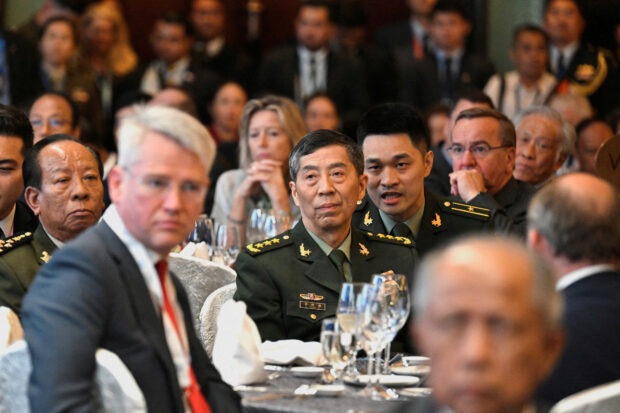Explainer: The China-US military chill: do they talk at all?

China’s Defense Minister Li Shangfu attends the 20th IISS Shangri-La Dialogue in Singapore June 2, 2023. REUTERS FILE PHOTO
HONG KONG — Amid intensifying military deployments across East Asia, high-level defense dialogue between China and the United States remains frozen. U.S. Secretary of State Antony Blinken did not secure any progress on the issue during his visit to Beijing last week. U.S. Defense Secretary Lloyd Austin attempted talks with China’s Defense Minister Li Shangfu during a defense conference in Singapore this month, but did not get beyond a handshake.
What is the situation now?
General Li, appointed in March, remains sanctioned by the U.S. over his role in a 2017 weapons purchase from Russia’s largest arms exporter, Rosoboronexport. Chinese officials have repeatedly said they want those sanctions, imposed in 2018, dropped to facilitate discussions.
Li and other senior officials also say they want signs from the U.S. of “mutual respect” – easing its patrolling and surveillance off China’s coasts and an end to arms sales for Taiwan. Neither is about to happen.The tension predates Li’s appointment, with Beijing’s scrapping three avenues of military communication in August 2022 in protest of then-House Speaker Nancy Pelosi’s visit to Taiwan. This scuppered planned talks between theatre-level commands, regular defense policy co-ordination and military maritime consultations, which included operational safety issues.
A senior U.S. defense official, speaking on condition of anonymity, said that since 2021 China had declined or not responded to more than a dozen requests to talk with the Pentagon and nearly 10 working-level engagement requests.
Regional countries are watching closely, with some leery of being drawn into a wider conflict or forced to choose between the superpowers.
Article continues after this advertisementServing and retired military officers stress the importance of smooth communications beyond political leaders, given the dangers of operational miscalculations.
Article continues after this advertisementHow deep is the freeze?
Significantly, it isn’t total. Diplomats and Chinese analysts say military attaches at embassies Beijing and Washington are still able to meet officials – an important element of routine communication.
Operationally, routine military ship-to-ship and aircraft-to-aircraft communication still takes place and is, according to three diplomats familiar with the situation, often professional at a basic level. At moments of tension, however, it is more fraught.
Senior Chinese military intelligence officials also participated in a secret meeting of regional spies in Singapore earlier this month – a session that included U.S. Director of National Intelligence Avril Haines.
What about the future?
Washington will still push for military dialogue – it is not a reward but a necessity, Austin said this month – but there is no sign the United States is about to drop sanctions on Li. And changes to U.S. deployments to East Asia or a significant shift in its Taiwan posture are even more unlikely.
With Li set to serve a five-year term, some Chinese analysts say it will be impossible for the U.S. to foster talks with military officials above or below him.
“The U.S. sanction on Li is like a tiger that blocks the path,” said Zhou Bo, a retired senior PLA colonel and a senior fellow at Beijing’s Tsinghua University.
Senior Chinese foreign ministry official Yang Tao also highlighted the sanctions on Li this week, telling Reuters at a briefing that it was “one of the reasons we cannot have military-to-military exchanges. The U.S. needs to first remove this obstacle”.
Some defense analysts say that in the short-term, routine discussions between theatre commanders would build confidence and ease tensions.
Another U.S. official said that the head of Indo-Pacific Command, Admiral John Aquilino, had a standing request to talk with his Chinese counterpart, Eastern Theatre commander General Lin Xiangyang, but that the conversation had not yet happened. The official said some lower-level interactions with the Chinese military had continued.
In the longer term, the Pentagon is eager to deepen engagement with China on broader strategic issues, particularly its nuclear weapons build up, but has signaled difficulties ahead.
“It remains unclear how the (Chinese) leadership and decision-makers accept the premise behind strategic stability, including the utility of crisis stability and communications,” the Pentagon’s annual China report said last November. “(Chinese) officials have been reluctant to engage on nuclear, cyberspace, and space issues as it pertains to strategic risk reduction in official or unofficial dialogue, particularly in defense channels.”
In Singapore this month, General Li told an audience of regional counterparts and scholars that China remained open to a military relationship but the “fundamental principle” had to be mutual respect.
Without that, he said, “then our communications will not be productive”.